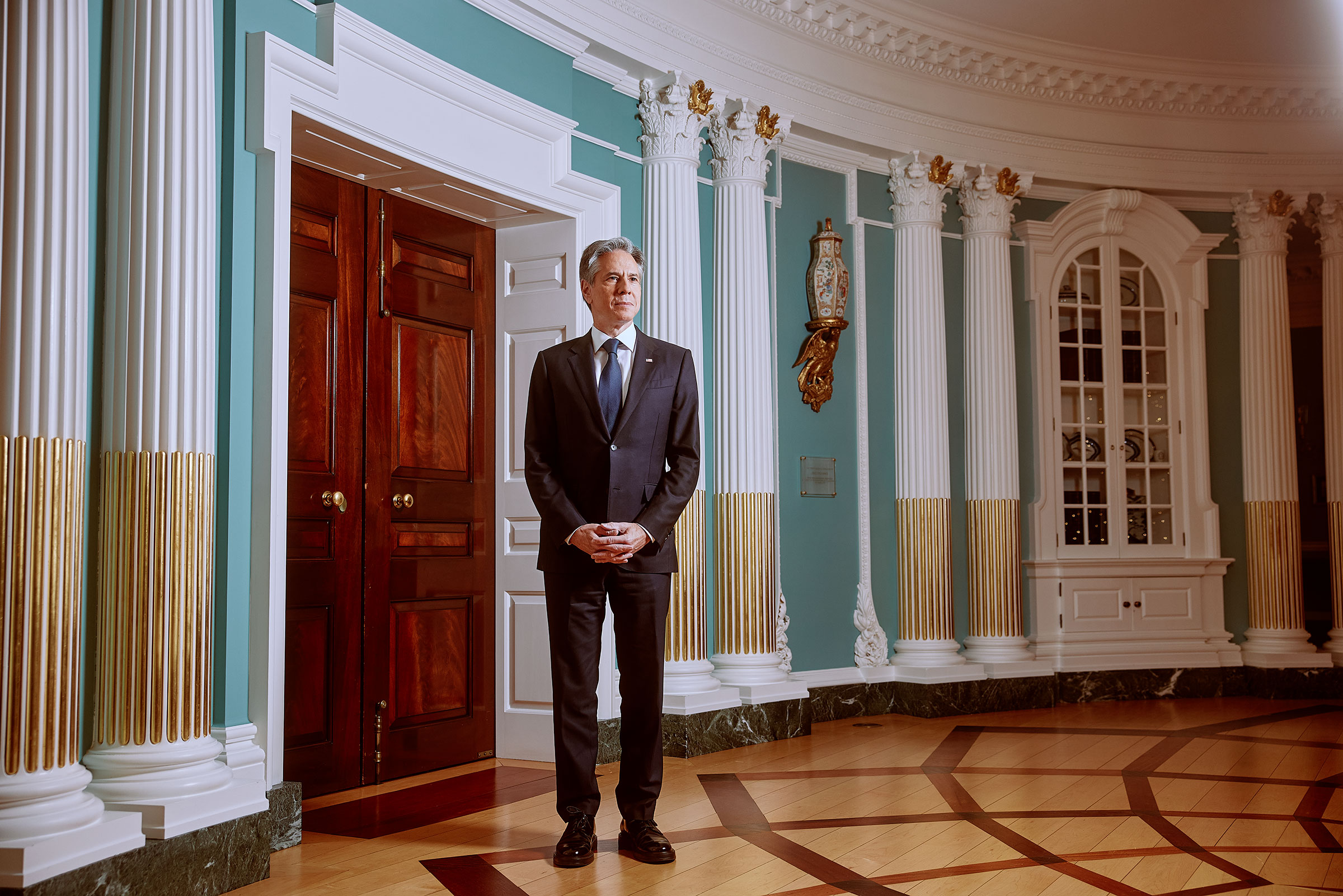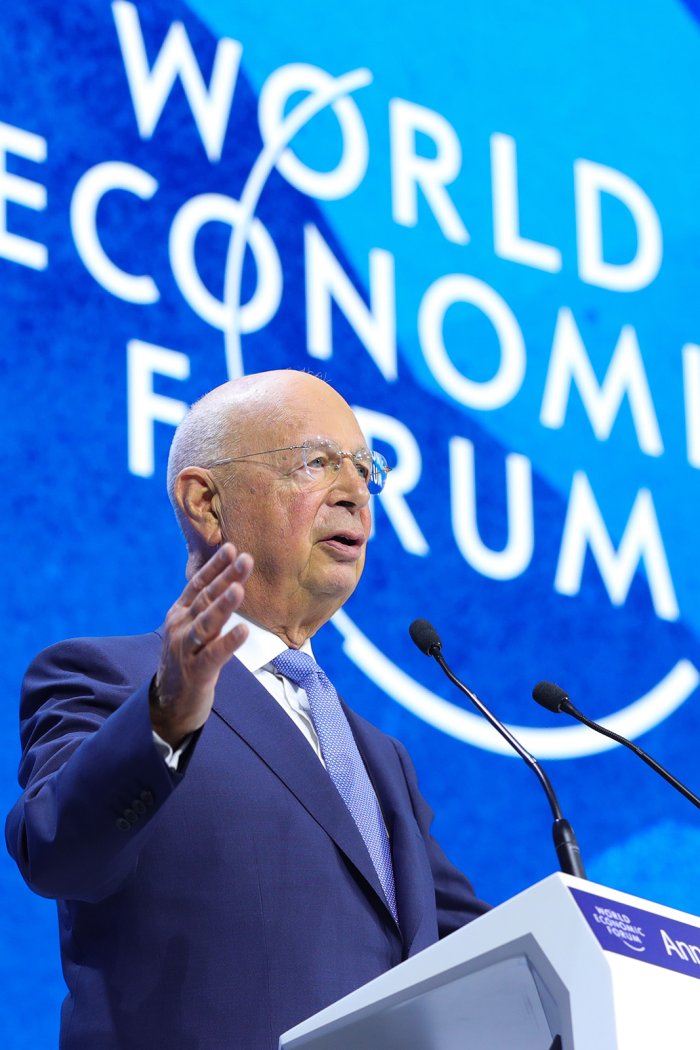It was 2:15 a.m. on Oct. 16, and Benjamin Netanyahu couldn’t figure out how to work the copy machine. Six floors underground, in the Tel Aviv bunker from which Israel’s war cabinet was directing its battle against Hamas, Secretary of State Antony Blinken waited to be handed a sheet of paper outlining the results of a nine-hour negotiating session with the Israeli Prime Minister. Even Blinken’s sleep-deprived advisers had no idea what the two men had agreed to behind closed doors.
Less than 24 hours earlier, Blinken had been in Cairo, preparing to return to Washington after a six-country dash across the Middle East. The visit had started off with a show of U.S. support after the brutal Hamas attack on Oct. 7, followed by talks with Arab allies. But as Israel intensified its bombing campaign in Gaza, Blinken decided to make a U-turn. Cut off from water, food, medicine, and fuel, the enclave was spiraling into a humanitarian crisis. Arriving back in Israel, Blinken conveyed to Netanyahu the anger he had heard from regional leaders and urged him to allow aid into Gaza. In a tense meeting punctuated by an air-raid siren, Netanyahu was intractable. Israel would not tolerate “one drop of water, not one ounce of fuel” across the border, a senior Administration official said. As it grew dark, Blinken and his aides followed Netanyahu from the Kirya, Israel’s version of the Pentagon, to the underground command center. Huddled around two laptops and a mobile printer, in a small room with no cell service, the U.S. team traded proposals with the Israeli cabinet next door. Some came back with Netanyahu’s hand-scribbled edits.
Finally, the Israeli Prime Minister and America’s top diplomat sat down alone. If Israel was going to proceed in its mission to destroy Hamas, it had to allow aid to reach civilians, Blinken told Netanyahu. He also made clear what was hanging in the balance: a visit from President Joe Biden, the prospect of which had leaked to the Israeli media but had yet to be formalized. A visit from Biden represented a critical gesture of support—and significant leverage. At 3 a.m., Blinken went in front of the cameras to announce that Biden would visit the country in two days to reaffirm his “ironclad commitment” to its security—and that Israel had agreed to allow food and medical supplies to reach civilians in Gaza. Five days later, the first 20 trucks rolled in. “Ultimately the logic prevailed,” Blinken told TIME in an interview in his wood-paneled office at the State Department in late December, his voice hoarse after the latest whirlwind trip.
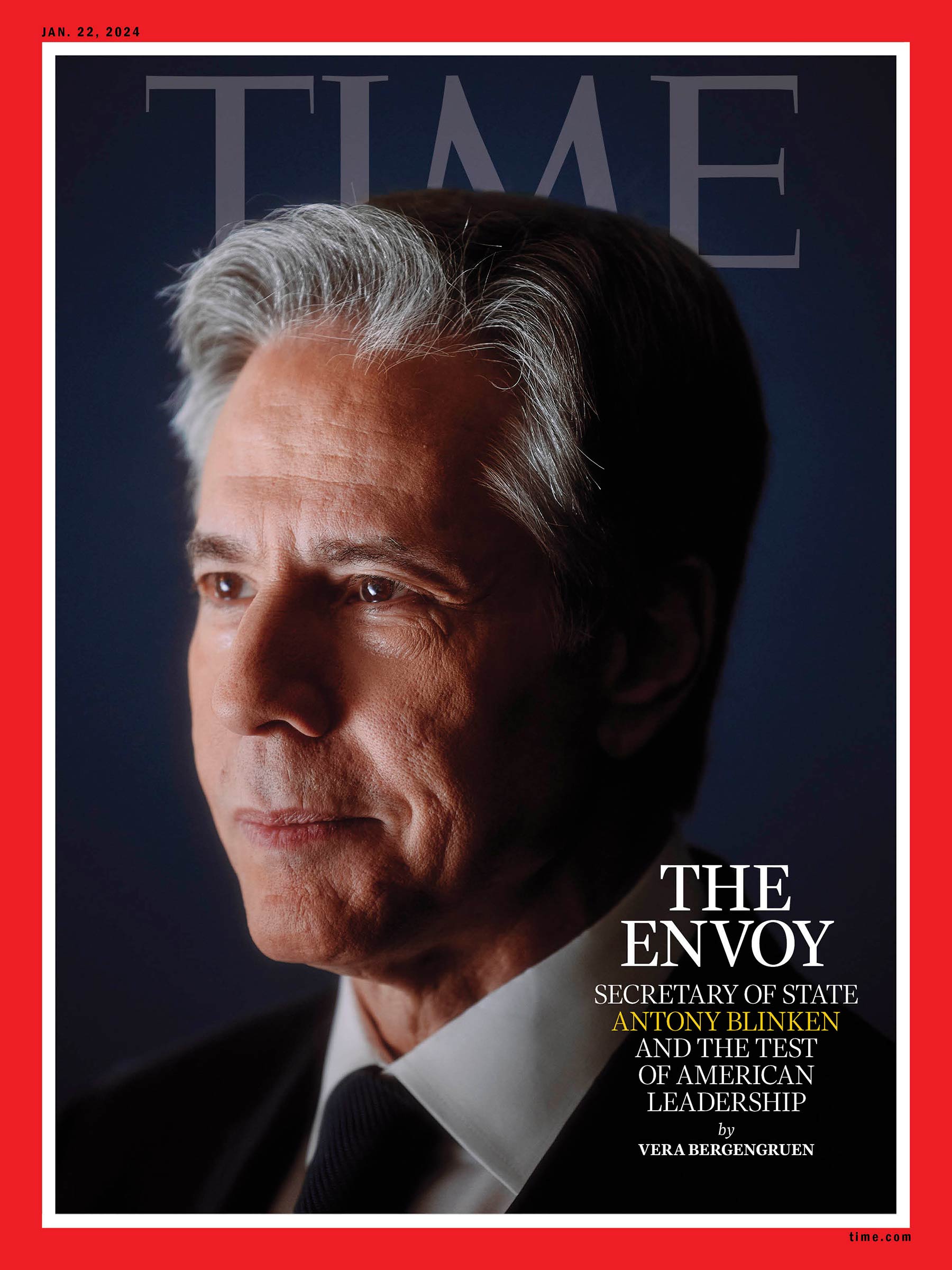
Buy a print of The Envoy cover, featuring Secretary of State Antony Blinken, here
Marathon negotiations like these are now the norm for Blinken. Over the past three months, the Secretary of State has spearheaded the Administration’s efforts to persuade Israeli officials to show restraint, while publicly backing a war that Gazan officials say has killed more than 22,000 Palestinians. As he lays them out, Blinken’s wins seem dwarfed by the scale of the devastation: More than 100 trucks of humanitarian aid entering Gaza in one day. The release of four American hostages. Four-hour humanitarian pauses. The figures are “totally insufficient in terms of what was actually needed,” Blinken says. “But you have to start somewhere.”
That is an uncomfortably apt analogy for American power in 2024. Biden promised to restore American leadership on the world stage after the chaos of the Trump years. But his tenure has been as much defined by evidence of its limits: America’s disastrous withdrawal from Afghanistan; the stalemated war in Ukraine; a century-defining challenge from a rising China; a conflict in Gaza that threatens to ignite a regional conflagration as it divides the Democratic Party and dampens Biden’s re-election prospects. The question hanging over it all is whether the U.S. is still capable of steering an increasingly dangerous world. More than anyone else in America besides Biden, it falls to Blinken to supply the answer.
In four trips to the Middle East since October, the Secretary of State, 61, has held meetings in royal palaces, military headquarters, villas, airport lounges, and bomb shelters. Arab leaders have rebuffed his hug, given him history lectures, and kept him waiting overnight. The Israelis have contradicted him publicly. Even officials close to Blinken admit the U.S. position—calling on Israel to do more to protect Palestinian civilians while continuing to tout their support—is becoming untenable. But in interviews with more than a dozen current and former senior U.S. officials and diplomats, most argue the Secretary’s even-keeled approach is a reassuring projection of American leadership at a perilous moment. “He’s the right guy at the right time,” says Tom Nides, who served as U.S. ambassador to Israel until July. “I’ve sat in those rooms with him and Bibi. Tony’s a nice guy—but don’t screw with him.”
For generations, America’s counterparts have simultaneously resented its power and sought it out. Even now, with its credibility dented abroad and its democracy under pressure at home, the U.S. is called by allies to lead on global problems like pandemics, artificial intelligence, and climate change. “It is a different world. This is a more multipolar world,” says former Secretary of State John Kerry. “That means more diplomacy, and Tony is perfectly situated to do that.” But the world seems intent on testing that proposition, and nowhere more so than in the Middle East.
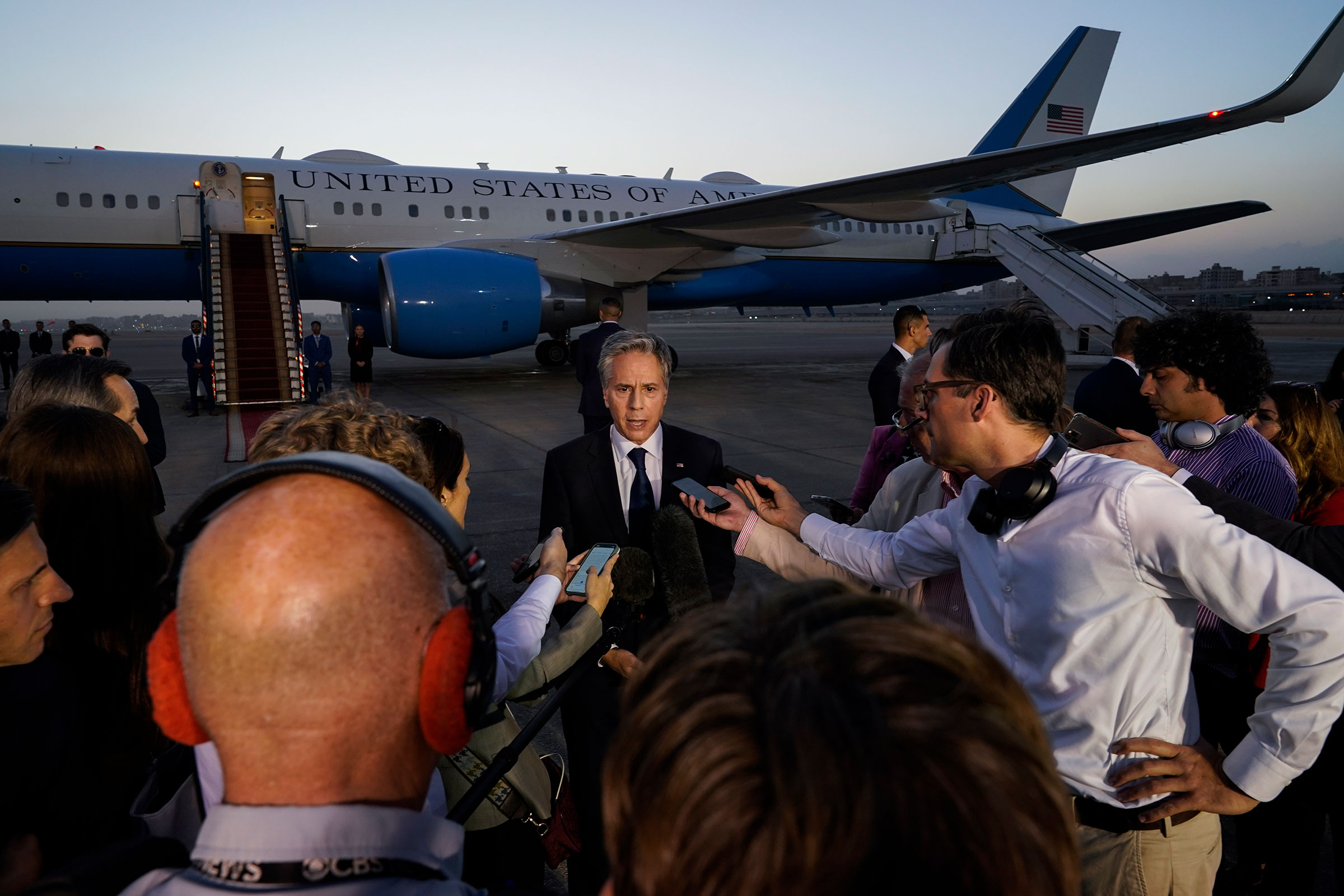
On the morning of Oct. 7, Blinken was awakened at his home in suburban Virginia at 5 a.m. His chief of staff was on the phone. A vicious surprise attack was unfolding in Israel, with thousands of rockets and Hamas fighters breaching the border. Across 30 years in government, Blinken says, “I don’t think I’ve seen anything quite like the nature of the atrocities that were committed.”
Five days later, Blinken arrived in Tel Aviv carrying a message of staunch support. “We will always be there by your side,” he promised, standing next to Netanyahu. “This must be a moment for moral clarity.” The grief and gratitude from the Israelis he met was overwhelming. In meetings with officials, he was shown gruesome photos of victims—one of a baby shot in the head; another of a baby’s burned body.
A planned two-day trip stretched into seven. Blinken hopscotched the region, making stops in Jordan, Qatar, Bahrain, Saudi Arabia, the United Arab Emirates, and Egypt. There could be “no more business as usual with Hamas,” he told Arab leaders, who agreed to keep open diplomatic channels to prevent escalation. As the U.S. entourage ducked into meetings, security officers wore body armor instead of suits; air-raid sirens sent staffers scurrying into shelters. In the end, Blinken left with a sense the U.S. had accomplished something solid. “It’s never like flipping a light switch. It’s always a process,” he says. “And there’s always a little bit of a lag between being there and seeing the actual realization.”
By his second trip to the region, in early November, the mood had shifted. Israel had followed its air campaign with a ground incursion into Gaza. The images of destruction, and the rising civilian casualty count, were producing mass protests around the world. The Israelis could tell U.S. officials felt the pressure. The strategy was to “give as much as possible to the Americans” on humanitarian issues, says former Israeli ambassador to the U.S. Michael Oren. The view was that “Biden needs time and space because he’s constricted by his own party.”
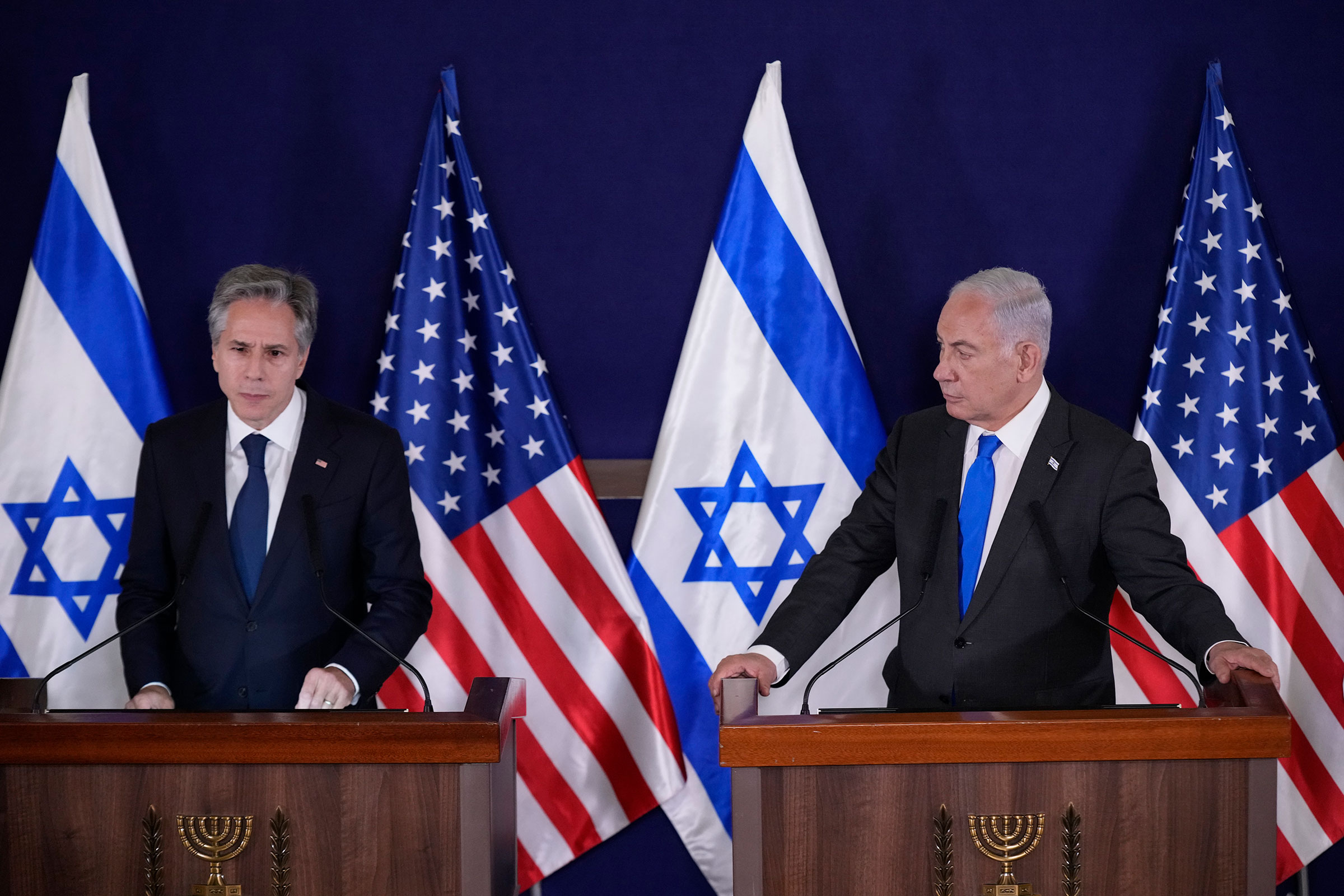
If that was the approach, it didn’t always show. Netanyahu defied American requests and contradicted its public positions while flaunting what he called the “diplomatic Iron Dome” of U.S. support. “We went from being there in commiseration with Israel, supporting a friend in a public outpouring of grief, to having these very difficult conversations, and having to push and push and push in a really tough negotiation,” says a senior Biden Administration official.
Blinken and his boss were left with choices that ranged between “very bad and worse,” says Aaron David Miller, a longtime Middle East adviser to both Republican and Democratic Secretaries of State. While Biden has a personal bond with Israel, there’s no love lost between him and Netanyahu, who repeatedly undermined the Obama Administration. But Biden knows feuding with an Israeli Prime Minister “never turns out well,” says Miller. “It can be politically costly and is usually counterproductive.”
Over time, Blinken’s public message began to change. He expressed empathy for Palestinian victims and noted the “gap” between Israel’s stated intent of protecting civilians and what was happening on the ground. “When I see a Palestinian boy or girl pulled from the wreckage of a building, it hits me in the gut,” he said at a Nov. 4 press conference. “I see my own children in their faces.”
The same day, sitting in a white swivel chair at the St. Regis hotel in Amman, Blinken got an earful from his Arab counterparts, according to a senior Administration official. They warned the U.S. was “wiping out 30 years of work” and giving the impression Israel was above international law. Ayman Safadi, the Foreign Minister of Jordan, one of America’s closest regional allies, told him Israel was committing war crimes. “If you want to help Israel, by all means help,” Safadi said. “But you’re not helping Israel by not speaking against this mad war.”
The conflict was becoming a test of America’s influence—and Blinken’s. As the face of the U.S. diplomatic effort, the Secretary came to shoulder the blame for what critics see as Israel’s excesses. On his visit to the West Bank city of Ramallah, demonstrators burned images of his face, crossed out with a red X. Ahead of his arrival in Ankara, a banner over a highway read Baby Killer Blinken. For someone used to working behind the scenes, friends say, the criticism has taken a toll. “It’s really, really tough and brutal—the physical toll, the pressure, the public glare,” says James Steinberg, the dean of the Johns Hopkins School of Advanced International Studies, who has worked with Blinken for decades. “If people don’t see that it’s changing Israeli behavior, then you bear the brunt of the failure to convey the message.”

Most nights, Blinken returns home after his two young children’s bedtime. So he has made it a priority to have breakfast with them in the morning. On Dec. 8, they were interrupted by protesters outside his house. “Blinken, Blinken, rise and shine,” they chanted, “you’re committing genocide.”
The Secretary comes from a diplomatic pedigree. His father Donald Blinken served as ambassador to Hungary, and his stepfather Samuel Pisar was a Polish-born diplomat and lawyer who survived four years in Nazi concentration camps as a teenager. After escaping a death march in Bavaria, Pisar was rescued by American soldiers, an event Blinken credits for shaping his worldview. Born in New York City, he largely grew up in Paris, which he says taught him to see America from the outside. He returned to the U.S. to attend Harvard, and dabbled in journalism, filmmaking, and law before joining Bill Clinton’s White House, where he worked as a speechwriter and on the National Security Council. In 1995, he met his wife Evan Ryan, who worked for then First Lady Hillary Clinton and now serves as Biden’s White House cabinet secretary.
Blinken went to work for Biden in 2002 as the Democratic staff director of the Senate Foreign Relations Committee. He served in various roles in the Obama Administration, including Deputy Secretary of State. It’s difficult to find a photo of Biden at any major moment in foreign policy over the past 20 years without Blinken in the background: wearing matching aviators in Kosovo; crammed into a helicopter in Baghdad; hovering in the back of the iconic Situation Room photo captured during the mission to kill Osama bin Laden. “Tony brings to the job the first and most important thing,” says Kerry, “which is the confidence of the President.”
When Blinken took over at State, after four years of a Trump presidency that disdained traditional diplomacy, the department was suffering from low morale, steep budget cuts, and high attrition. The contrast with Blinken’s predecessor Mike Pompeo, who vowed to restore “swagger” to State and signed emails “keep on crushing it,” could not have been starker. “Tony doesn’t swagger,” says Barbara Bodine, a former U.S. ambassador to Yemen and a 30-year veteran of the Foreign Service. “He does not lead with his ego.”
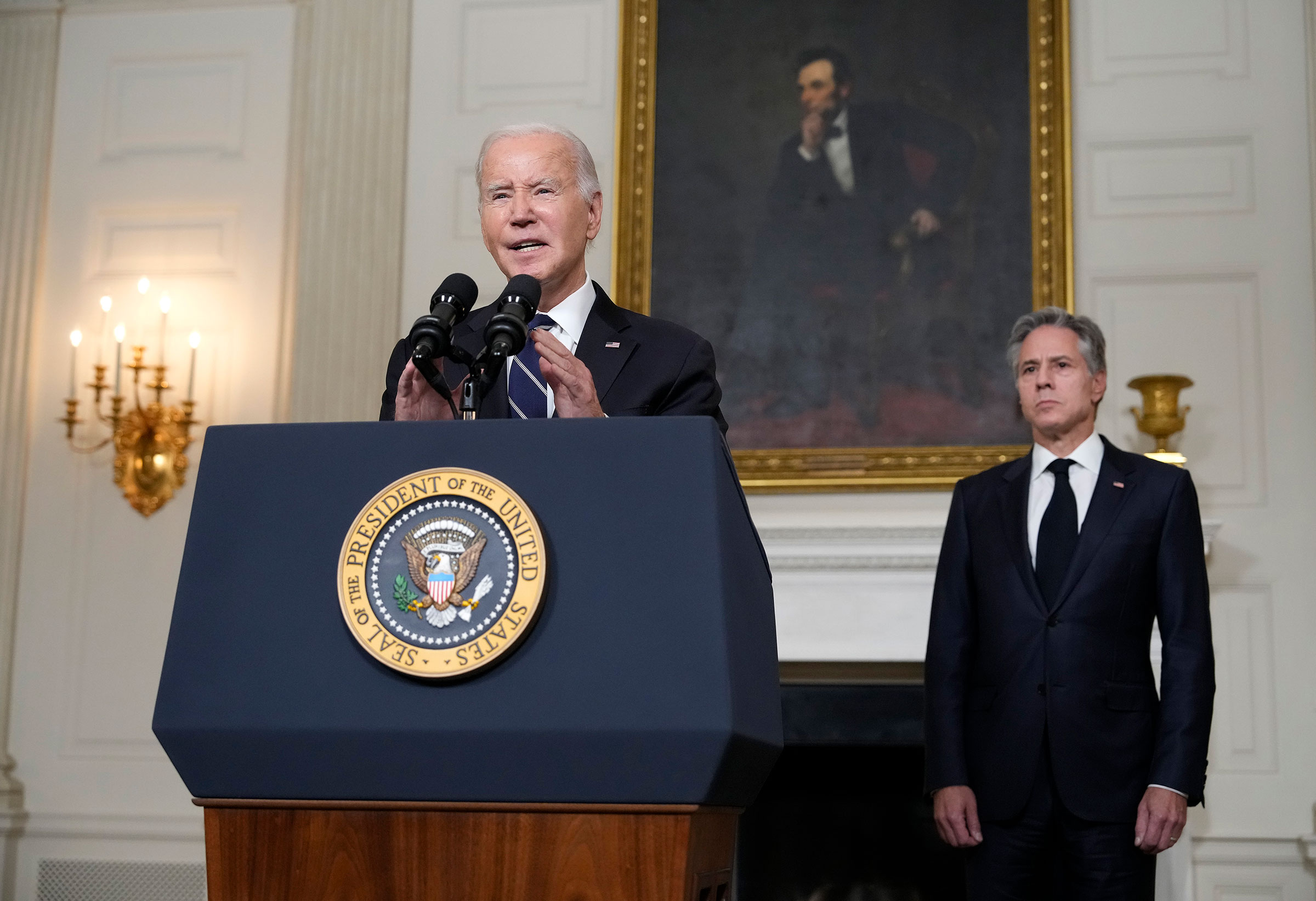
Blinken was a departure in other ways. He does not have the military gravitas of Colin Powell, or the political celebrity of Hillary Clinton or Kerry. In describing his style, three former colleagues invoked former Secretary of State George Shultz’s oft-cited analogy comparing diplomacy to gardening. “The way to keep weeds from overwhelming you,” Shultz liked to say, “is to deal with them constantly and in their early stages.” But Shultz was at State during the Cold War. Today’s world presents a different set of challenges, which has made the unglamorous work of tending global ties, rather than bending nations to Washington’s will, both more relevant and more challenging. “This is what I was instructed to do by the President from day one,” says Blinken. “This has been for many, many years, in a sense, our secret sauce, something that really is our competitive advantage—our networks of partners and allies that other countries, notably our adversaries, simply don’t have.”
Blinken is one of several key players on a Biden team featuring longtime colleagues like National Security Adviser Jake Sullivan and CIA Director Bill Burns. It was Burns, a veteran diplomat, who was tasked with negotiating the release of the American hostages still held by Hamas. Sullivan has embarked on his own Middle Eastern tour, and serves as a primary conduit to Ukraine. Blinken’s incoming deputy Kurt Campbell, meanwhile, shapes China policy. To some, the overlapping mandates produce confusion.
But the main critique of the Biden team is that the President’s decision to surround himself with supportive staffers results in groupthink. In 2021, the State Department came under heavy criticism for its failure to foresee the rapid collapse of the Afghan government, and for not acting quickly enough to move U.S. troops and Afghan allies to safety, leading to deadly violence and a chaotic airlift of more than 120,000 people. A report commissioned by Blinken found a lack of clear communication and decisionmaking and “insufficient senior-level consideration of worst-case scenarios” contributed to the bungled exit.
Yet the common worldview and low-drama approach of Biden’s team has also been an asset. In late 2021, Blinken pulled Ukrainian President Volodymyr Zelensky aside at a climate summit in Glasgow to lay out U.S. intelligence that pointed toward a Russian invasion. As Ukraine and other European allies dismissed those warnings, the U.S. team scrambled to prepare for war. When Russia invaded, Blinken successfully rallied allies to Ukraine’s defense. He has made four trips to Ukraine and more than a dozen to visit European allies, reinvigorating the NATO alliance and helping to coordinate more than $110 billion in support of Kyiv.
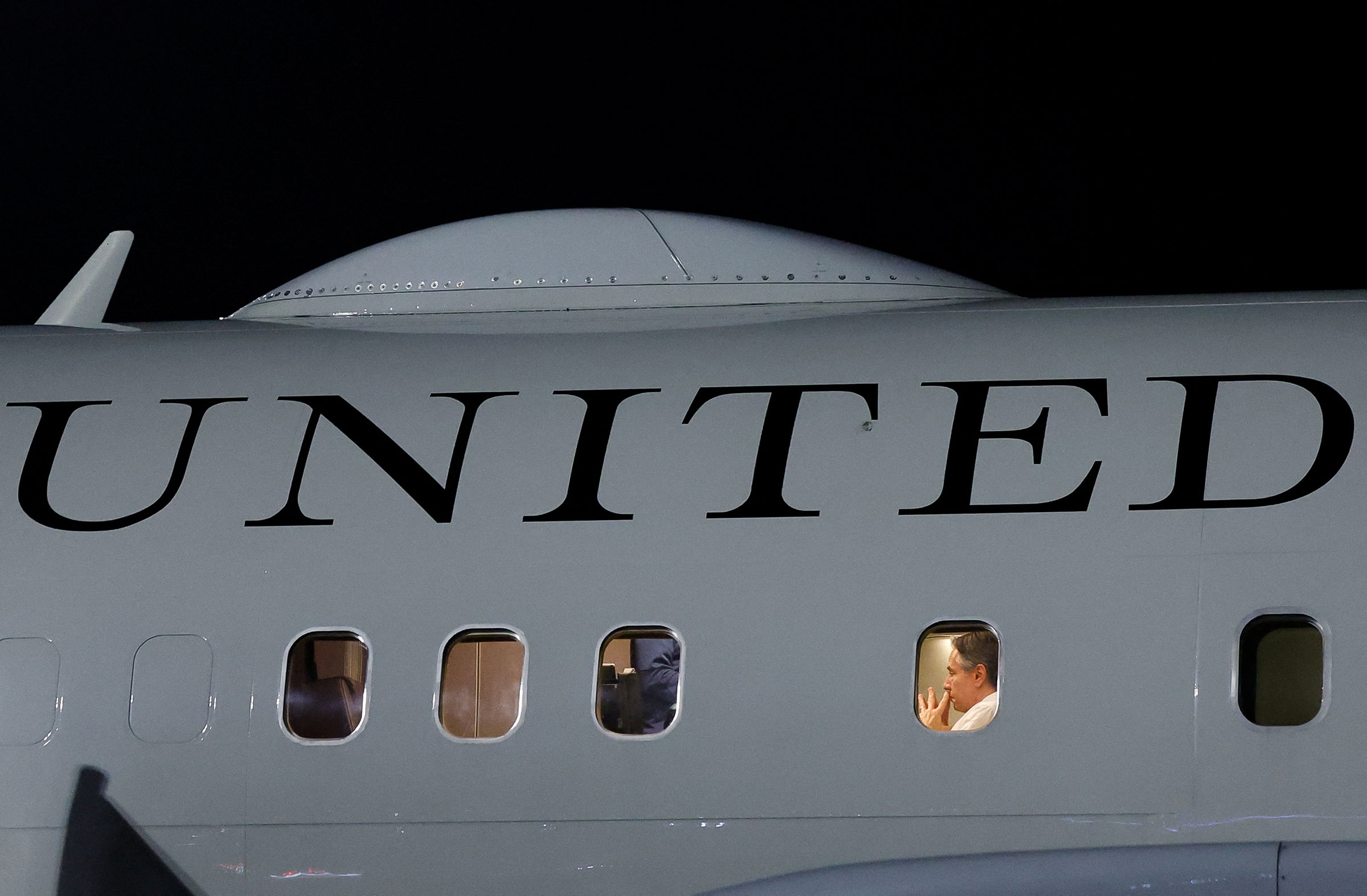
But as the war in Ukraine nears its second anniversary, the conflict has become more a point of concern about U.S. leadership than a reassuring example of it. That is partly due to the Administration’s challenges at home. Republicans, once staunch hawks, now argue for cutting foreign spending to confront aggression by Vladimir Putin’s Russia. “We have to keep reminding people that if we allow Putin to move forward with impunity in Ukraine, we would be opening a Pandora’s box,” Blinken says. “Putin wouldn’t stop with Ukraine.”
What really worries foreign allies is the return of American isolationism, as personified by Trump. The 2024 election looms over every recent meeting and negotiation. Many abroad wonder whether they can rely on the U.S., or if it is about to abdicate global leadership just as conflicts threaten to expand on three continents. “Even our best partners and allies are going to hedge their bets,” says Tom Shannon, who worked with Blinken in the Obama-era State Department. “They’re not sure whether this Administration is a turn away from Trumpism or just an interregnum.”
Less than a year from the election, 57% of registered voters disapprove of Biden’s handling of the war in Gaza, according to a recent New York Times poll. Inside the State Department, Blinken has fielded multiple internal dissent cables decrying U.S. support for Israel. “We’ve refused to let our policy keep up with the realities on the ground,” says Josh Paul, who resigned as a director at the State Department office that handles arms transfers to foreign powers over the Administration’s handling of the war in Gaza. “Not only are we facilitating all these civilian casualties, but we’re doing so in support of a policy that isn’t going to lead to peace and security for Israel, let alone for the Palestinians.”
Blinken, who has met with the dissenters and tells TIME he reads every memo, acknowledges the broader problem. “Our strength at home goes directly to our standing around the world,” he says. He also argues the U.S. is stronger than its critics credit. “I have found that people have seen that we’re serious about ourselves,” he says, “and they want to work with us.” Spending more on defense than the next 10 countries combined, the U.S. military remains unmatched. America’s economy remains the envy of the world.
Yet as Blinken gears up for his fourth trip to the Middle East since Oct. 7, the U.S. faces a growing array of global tests. Iran’s proxies have stepped up attacks on U.S. troops and vital shipping lanes of the Red Sea. North Korea has tested new inter-continental ballistic missiles. China has grown more confrontational with U.S. allies in the South China Sea. With a pro-U.S. front runner in the upcoming election in Taiwan, China’s leader Xi Jinping recently told Biden that it intends to take control of the island. The weeds Blinken is trying to control are sprouting into thickets.
Fairly or not, America’s ability to navigate the war between Israel and Hamas has become a litmus test of its power. Blinken says bringing the war to an end as quickly as possible will be one of the Administration’s main priorities in 2024. But Israeli officials insist the operations will last months at least. To some, the gap between what the U.S. wants and what it can deliver is diminishing its credibility. “I think we look confused,” says former Trump National Security Adviser John Bolton. “You can tell Israel to go slower, you can tell Israel to go fast, but you can’t tell it to do both at the same time.”
Blinken, the consummate old-school diplomat, appears unperturbed by the criticism. “All we can do is be responsible for the moment that we’re in,” he says, gripping the arm of a chair in his office. “We’re trying to put in place a foundation that is durable and lasting irrespective of who happens to be in office.” From his window, the Secretary of State has a view of the Lincoln Memorial, a temple erected in tribute to a President who led during a period of rupture in the Republic. As Blinken spoke, a cleaning crew was scrubbing a message splashed in bright red paint over its marble steps. The words were still visible: “Free Gaza.” —With reporting by Eric Cortellessa
- Cybersecurity Experts Are Sounding the Alarm on DOGE
- Meet the 2025 Women of the Year
- The Harsh Truth About Disability Inclusion
- Why Do More Young Adults Have Cancer?
- Colman Domingo Leads With Radical Love
- How to Get Better at Doing Things Alone
- Michelle Zauner Stares Down the Darkness
